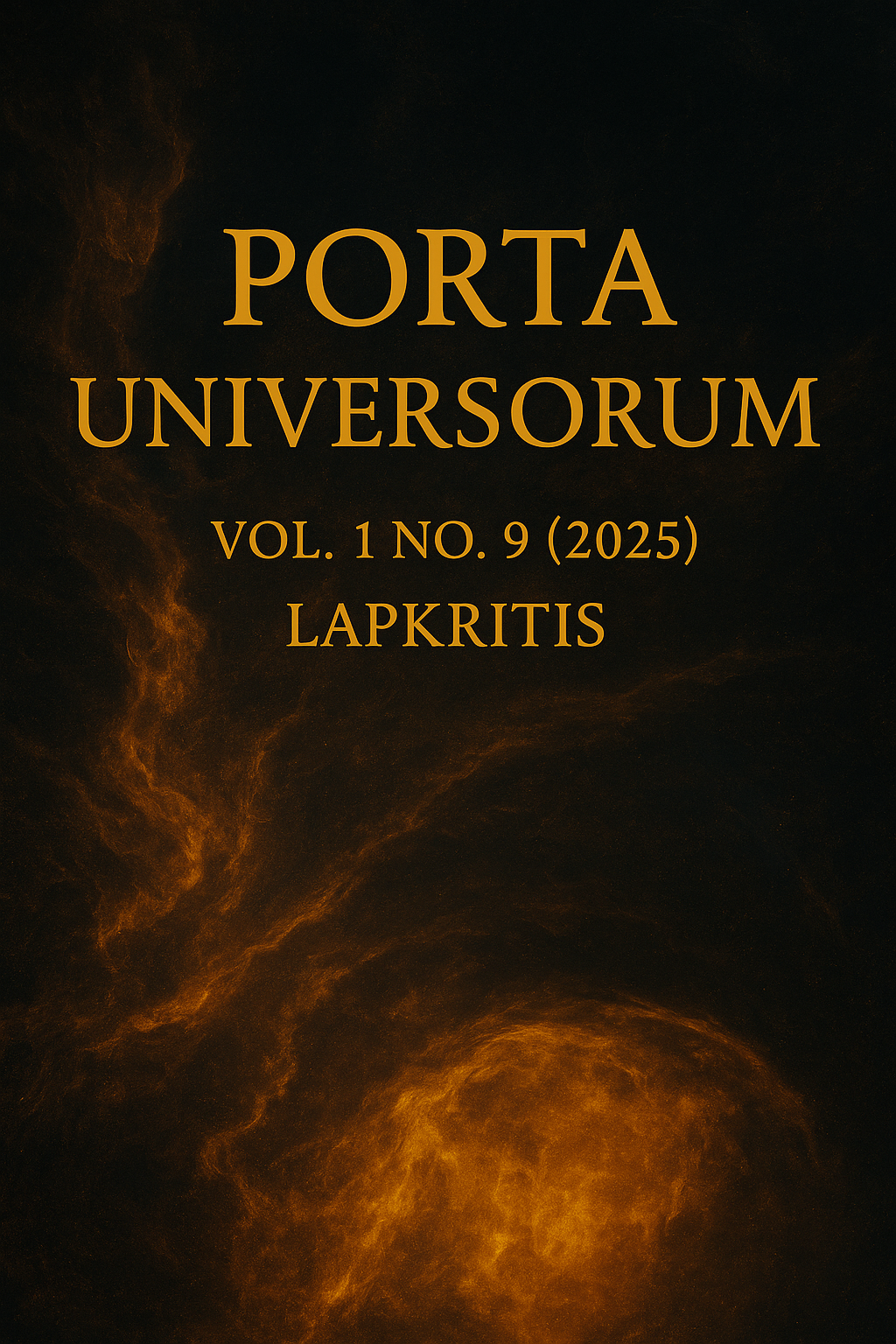AI-Mediated English: How Generative Systems Reinforce English as a Global Lingua Franca
##semicolon##
https://doi.org/10.69760/portuni.0109004##semicolon##
Generative Artificial Intelligence##common.commaListSeparator## Global English##common.commaListSeparator## English as a Lingua Franca##common.commaListSeparator## Language EducationSantrauka
English has long been the world’s lingua franca, dominating international communication, science, and media. The recent rise of generative Artificial Intelligence (AI) systems – from large language models like ChatGPT to AI-powered translation and writing tools – is poised to further entrench English’s global dominance. This article explores how AI-mediated communication may be reinforcing English as the de facto global language. We synthesize current research and examples to examine biases in multilingual AI performance, the standardization of English via AI tools, and the ways AI adoption encourages even greater use of English worldwide. Results indicate that popular generative AI systems disproportionately favor English (and standard varieties of English), often at the expense of linguistic diversity. AI-generated content tends to homogenize toward mainstream English norms, marginalizing minority languages and non-standard dialects. Furthermore, non-native speakers increasingly rely on AI to produce English text, accelerating the spread of English in academia, business, and everyday communication. We discuss the implications of these findings for language learning and global linguistic equity. Finally, we highlight strategies – from diversifying training data to critical pedagogical practices – that could mitigate AI’s English-centric biases and foster a more multilingual AI future.
##submission.citations##
Amin, M., Rasheed, H., Ali, S., & Ara, A. (2025). Artificial intelligence and the standardization of global English: A sociolinguistic inquiry. Qualitative Research Journal for Social Studies, 2(3), 365–384. https://doi.org/10.63878/qrjs3.10
Alisoy, H. (2022). The importance of listening in language acquisition. Xarici Dillərin Tədrisi Və Tədqiqində Ənənəviliyin Və Müasirliyin Vəhdəti, 5(5), 44–50.*
Alisoy, H. (2025). Structural and semantic taxonomy of English phraseological units: A theoretical perspective. Porta Universorum, 1(8), 61–82.*
Alisoy, H. (2025). From echo chambers to critical dialogue: A comparative case study of social media-based pedagogy for addressing scientific misinformation. Global Spectrum of Research and Humanities, 2(4), 35–47. https://doi.org/10.69760/gsrh.0250203002
Alisoy, H., Hajiyeva, B., & Sadiqzade, Z. (2024). Connect with English A2–B1 Speaking Handbook. Journal of Azerbaijan Language and Education Studies, 1(2), 1–115.*
Alisoy, H., Mammadova, I., Asadova, B., Ismayilli, F., & Aliyeva, T. (2024). The future of language education: Integrating smartphones into the curriculum. Edelweiss Applied Science and Technology, 8(6), 4539–4556.*
Alisoy, H., & Sadiqzade, Z. (2024). Mobile-assisted language learning (MALL): Revolutionizing language education. Luminis Applied Science and Engineering, 1(1), 60–72. https://doi.org/10.69760/lumin.202400002
Crotty, D. (2024, February 23). AI, translations, and the dominance of the English language. The Scholarly Kitchen. https://scholarlykitchen.sspnet.org
Lai, V. D., Ngo, N. T., Veyseh, A. P. B., et al. (2023). ChatGPT beyond English: Towards a comprehensive evaluation of large language models in multilingual learning. Findings of EMNLP 2023 (Long Papers). https://openreview.net
Lee, S., Jeon, J., & McKinley, J. (2025). Generative AI and English language teaching: A global Englishes perspective. Annual Review of Applied Linguistics, 45, 85–108. https://doi.org/10.1017/S0267190525100184
Lepp, H., & Smith, D. S. (2025). “You cannot sound like GPT”: Signs of language discrimination and resistance in computer science publishing. In Proceedings of the 2025 ACM Conference on Fairness, Accountability, and Transparency (FAccT ’25). https://doi.org/10.1145/3715275.3732202
Mammadova, I. (2024). The role of proverbs in language learning: A cognitive and cultural perspective. EuroGlobal Journal of Linguistics and Language Education, 1(1), 40–45. https://doi.org/10.69760/8qj8tr41
OpenAI. (2023). GPT-4 System Card [Technical report]. OpenAI.
Patterson, J. (2025, September 2). Multilingual artificial intelligence often reinforces bias. Johns Hopkins Hub. https://hub.jhu.edu
Rajesh, A., & Padma, P. (2025). Lingua Franca 2.0: The enduring power of English amidst artificial intelligence. International Journal of Language, Literature and Culture, 5(4), 60–65. https://doi.org/10.22161/ijllc.5.4.9
Sadiqzade, Z. (2024). The foundational role of auditory skills in language mastery. Acta Globalis Humanitatis et Linguarum, 1(1), 82–87.*
Sadiqzade, Z. (2024). The impact of music on language learning: A harmonious path to mastery. EuroGlobal Journal of Linguistics and Language Education, 1(1), 134–140.*
Sharma, N., Murray, K., & Xiao, Z. (2024). Faux polyglot: A study on information disparity in multilingual large language models (NAACL 2025 presentation). arXiv Preprint, arXiv:2407.05502. https://arxiv.org/abs/2407.05502
Vashee, K. (2023, June 28). Making generative AI effectively multilingual at scale. ModernMT Blog. https://www.modernmt.com/blog
Zeng, J., & Yang, J. (2024). English language hegemony: Retrospect and prospect. Humanities and Social Sciences Communications, 11(317). https://doi.org/10.1057/s41599-024-02821-z
##submission.downloads##
Publikuota
Numeris
Skyrius
##submission.license##
##submission.copyrightStatement##
##submission.license.cc.by-nc4.footer##License Terms
All articles published in Porta Universorum are licensed under the Creative Commons Attribution–NonCommercial 4.0 International License (CC BY-NC 4.0). This license permits:
-
Sharing (copying and redistributing the material in any medium or format),
-
Adapting (remixing, transforming, and building upon the material),
-
for non-commercial purposes only,
-
with proper attribution to the original author(s) and source.
Commercial use of the material is not permitted without prior written permission from the publisher.




